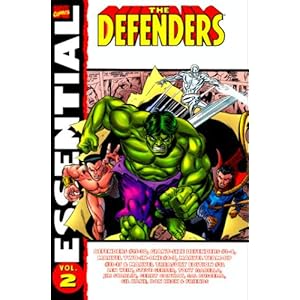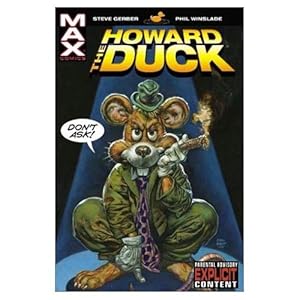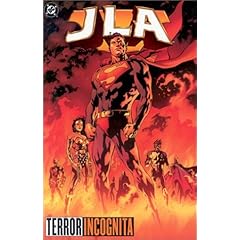
Here's a title that has mostly not aged at all well, but there's a run in the middle that is nevertheless completely transcendent. I just finished rereading all four volumes of Marvel's Essential Defenders, covering about the first 90 issues along with a pile of tie-in and crossover volumes, and it turned into a real slog at the end, but when Steve Gerber was writing it, this was even better than I remembered, and a real gem.
The concept came from the pen of Rascally Roy Thomas, a "tie-everything-together" fanboy who enjoyed making anybody who wanted to read comics be required to absorb fifty-eleven footnotes referring to previous adventures. In some of the books he wrote and edited, he started having some of Marvel's heavy hitters join forces against various threats to our universe. Eventually, these characters formalized for the readers' benefit in a title called The Defenders but didn't formalize with bylaws or elections or anything silly like what the Avengers were doing with their ID cards and government clearance. Much of these stories are standard period juvenilia, just fun beat-em-ups by the likes of Len Wein and Gerry Conway with occasionally terrific artwork by Sal Buscema.
Volume Two is the book to buy. Starting with a storyline that begins in the pages of the anthology Marvel Two-in-One, the late, great Steve Gerber took the writing chores for 28 issues, including tie-ins and quarterly "giant-sized" issues. Sixteen of these appear in the second volume and twelve in the third, but, unfortunately, his run is not quite complete. In one issue, the Hulk leaves the action to make a memorable guest appearance in Gerber's Omega the Unknown before returning to the Defenders storyline. Since Marvel does such a good job catching all the ephemera and tie-ins in these Essential books, the omission is pretty glaring. It's possible that, as Gerber was unhappy with Marvel resurrecting the character around this time, the publisher just shelved it either for legal reasons or grouchiness.
Anyway, Gerber's run is a vibrant and wild counterpart to his seminal run on Howard the Duck at the time, with a host of very strange villains called the Headmen taking center stage and our heroes dealing with stolen brains and an interplanetary Amway salesman called Nebulon, among other thunderously weird stuff. It's biting, unexpected and surprising at every turn and has aged very well. I like it far more than I remembered it, and I remember it as being great. If Marvel had any sense, they would reprint the full 29-issue run across two hardcovers, in color. I would buy the heck out of those books.
Unfortunately, Marvel's strange policy in the seventies of moving creators here and there without any rhyme or reason puts an end to the wonderful run. David Anthony Kraft and Ed Hannigan take things from there and these haven't aged at all well. Of low note, there's Hannigan's bizarre decision to turn Kraft's urban criminal Lunatik into some sort of otherdimensional exile, and Herb Trimpe's uninspiring art, and this one completely weird issue by Kraft and Carmine Infantino where most of our heroes, found unconscious on the Siberian shores and dying of radiation poisoning, spend several days being transported to Moscow and treated by Bruce Banner while the action keeps switching to a chase and fight scene in New York City that maybe takes twenty minutes. The books have a really odd sense of time and keep confronting readers with it. The characters occasionally refer to events from comics published twenty-four months previously as happening "two years ago," grounding the action in a one month/one issue timeline, and then making Nighthawk's civilian identity suffer a federal audit that pretty much takes up Carter's entire time in the Oval Office.
Finally, there's a villain in a storyline set in Asgard who must be seen to be believed. One day this guy, who dresses in dragon armor with a huge, teeth-filled "mouth" helmet, is going to end up as a feature at Nobody's Favorite. Maybe he doesn't stand out too much in a book with guys with giant bird wings coming out of their ears and Xemnu the Titan, but he even struck me as faintly ridiculous when I was nine. Anyway, volume one, I'd recommend for readers who have a taste for old superhero fight comics. The second and third volumes are must-haves, at least until Marvel reprints the Gerber stories in a better format. Volume four will even strain the patience of completists. There's a fifth volume out now; I figure I can live without it.




